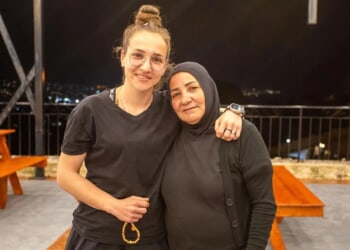One of Pope Leo XIV’s first major personnel changes could be significant. He has appointed Cardinal Baldassare Reina to replace Archbishop Vincenzo Paglia as head of the Pontifical John Paul II Theological Institute for Marriage and Family Sciences. What gives cause for hope is a cause that Reina himself supported.
Her name is Chiara Corbella Petrillo.
Chiara Corbella was born in Rome on January 9, 1984. Through her teen years and into her early 20s, she grew into a remarkable woman of faith. She made frequent spiritual pilgrimages outside the Eternal City, particularly to Assisi, home of Saints Clare and Francis. She also made a pilgrimage to Medjugorje, a former Yugoslavia village known for alleged apparitions of the Virgin Mary. It was in Medjugorje that she met her husband, Enrico Petrillo.
The two married and were eager to have a family. They conceived on their honeymoon. Their excitement, however, was soon tempered when the ultrasound revealed that their unborn child had anencephaly. Chiara and Enrico were asked if they would like to abort. They said no. The child was born on June 10, 2009, but tiny Maria Grazia Letizia died only a half hour later.
Chiara’s next pregnancy was even more problematic. The ultrasound revealed severe malformations, including no kidneys and no lower limbs. Asked again if they wanted to abort, Chiara and Enrico said no. The child was born Davide Giovanni on June 24, 2010. Like the sister who preceded him, Davide lived only about 30 minutes.
Unafraid, Chiara and Enrico did not give up on life. And in fact, the news for their third pregnancy was much better: the ultrasound revealed a healthy baby boy. But then, major health complications struck again — this time to the mother.
Chiara was diagnosed with cancer on her tongue and face. She refused treatment because she feared the chemotherapy and other drugs would harm her unborn child. To save her own life, she could accept the cancer treatment and could abort her child. Chiara refused.
“Humanly we can do nothing except to pray and to ask God for the strength to live this trial in sanctity,” said Chiara. She went to Mass every day and offered up her suffering.
On May 30, 2011, Chiara gave birth to a perfectly healthy boy, who she and Enrico named Francesco, after Saint Francis.
Immediately after Francesco’s birth, Chiara started receiving intense cancer treatments, but it was too late. The cancer had metastasized throughout her body. She had trouble speaking, seeing, and wore an eyepatch. There was no saving her.
Chiara died at home on June 13, 2012. She was dressed in her wedding gown, with her beloved husband at her side. She was only 28 years old.
Just days before, Chiara had written a letter to little Francesco for his first birthday:
My dearest Francesco,
Today you are one-year-old, and we asked ourselves what gift we could give you that would last through the years, and so we decided to write you a letter. You were a great gift in our life because you helped us to look beyond our human limits. When the doctors wished to frighten us, your life, so fragile, gave us the strength to go forward.
For the little I have understood during these years, I can tell you only that Love is the center of our life. Because we are born from an act of love, we live in order to love and in order to be loved, and we die in order to know the true love of God. The goal of our life is to love and to be always ready to learn how to love others as only God is able to teach you. Love consumes you, but it is beautiful to die consumed precisely as a candle that goes out only after it reaches its goal.
Whatever you do will have sense only if you see it in terms of eternal life. If you truly love, you shall be aware of it by knowing that nothing truly belongs to you because everything is a gift.
We loved your brother and sister, Maria and Davide, and we have loved you, knowing that you were not ours; that you were not for us. And so it must be with everything in life. Everything that you have does not belong to you; that is so you can make it bear fruit. Do not ever be discouraged, my son. God does not ever take anything away from you. If He takes something from you, it is only because He wishes to give you so much more.
Thanks to Maria and Davide, we are more in love than ever with eternal life, and we have stopped being afraid of death. Therefore, God has taken from us in order to give us a bigger heart and to be opened to receiving eternity during this [earthly] life….
We know that you are special and that you have a great mission; the Lord has wanted you from all time, and He will show you the path to follow, if you open up your heart to Him.
Trust in Him. It is worth the pain!
Mamma Chiara and Papà Enrico
Today, Francesco is a thriving 12-year-old boy, ready to embrace his teen years and whatever path lay ahead—a mission made possible by a loving mother who sacrificed her life for his.
Chiara’s Cause for Canonization and Cardinal Reina
Chiara Corbella Petrillo lived a saintly life, so much so that not long after her death many began calling for her canonization. In fact, she has been called “the second Gianna,” in reference to the extraordinary Saint Gianna Beretta Molla, an Italian woman and physician who in April 1962 likewise gave up her own life for the child in her womb. Gianna was beatified by Pope John Paul II in April 1994, the Year of the Family, and canonized by him in May 2004.
For Chiara, such a process is likewise underway. Her beatification was opened at the Vatican on July 2, 2018.
More steps along that route have begun. And one of them brings me back to the cardinal who was just appointed to an important position for the pro-life cause by the new pope, Leo XIV. That priest is Baldassare Reina.
Reina happened to be the priest who in June 2024 presided over the closing session of the so-called “Diocesan Inquiry Into the Life, Virtues, Reputation for Sanctity and Signs of the Servant of God Chiara Corbella.” This was the first step toward sainthood for Chiara. The ceremony was held at St. John Lateran Basilica in Rome. There, in front of the late Chiara’s husband and surviving son, Reina testified beautifully on her behalf:
It is a day of joy and celebration for our diocese, for the whole Church, for the Church of Rome in particular. We thank the Lord both for the gift of Chiara’s life, and for the gift of holiness, this seed that God planted in the heart of each one of us on the day of our baptism.
We are here to contemplate a shoot, a seed of holiness that the good Lord placed in Chiara’s heart and that we contemplate today. We thank the Lord for this sister of ours. We commit ourselves to imitating Chiara, because we are all called to holiness in our daily lives, in difficulties, in problems, in illnesses. Chiara teaches us, together with an infinite host of men and women, that holiness is a possible path. It is the only path that makes us happy.
Reina continued: “We strongly trust that the Church, after a careful and accurate discernment of her life and virtues, will want to soon celebrate also on earth this daughter of our Church of Rome and propose her as an example of Christian life to contemporary Christian generations.”
Monsignor Reina was inspired by Chiara’s case. And now, Pope Leo XIV was inspired to appoint Cardinal Reina to a key pro-life position.
This past Monday, the day after his installation Mass, Leo XIV made one of his first personnel appointments, and a major one, naming Cardinal Reina as grand chancellor of the Pontifical John Paul II Theological Institute for Marriage and Family Sciences. Reina thereby replaces Archbishop Vincenzo Paglia, handpicked by Pope Francis in 2016. Paglia had turned 80 on April 20, and was overdue to be replaced, in accordance with Vatican guidelines. Leo XIV did not hesitate to act.
Paglia’s appointment was a mess, a controversy heaped atop a controversy. Francis had outraged Catholics worldwide when he inexplicably in the year 2017 attempted to reestablish the Pontifical Institute for Studies on Marriage and Family founded by the Polish pontiff in 1982, changing its focus and releasing key faculty who had faithfully served and defined the institute’s work. Paglia and allies implemented what they hailed as a “new pastoral theology” anchored more in conventional sociology and secular social sciences than the moral theology that was the hallmark of John Paul II.
The results were disastrous. A thriving institute under Popes John Paul II and Benedict XVI for over 40 years was suddenly dying.
The decline at John Paul II’s blessed institute was a direct result of Paglia’s confusing statements (much like Francis’ own often ambiguous remarks) as well as staff and financial mismanagement. From Paglia and his new scholars came moral statements that seemed to contradict Church teachings on subjects from abortion and contraception to euthanasia and assisted suicide. Symptomatic of Francis’ own leadership, there was chaos at this institution once renowned for moral clarity.
John Paul II biographer George Weigel stated unequivocally that under Archbishop Paglia’s leadership, the Pontifical Academy had “betray[ed] the intention of the saint and scholar who founded it.”
Will Reina be an improvement? One would hope so.
The Pillar rightly calls Paglia’s replacement “one of the most significant personnel changes in the opening weeks of Pope Leo XIV’s pontificate.”
As for the 54-year-old Reina, The Pillar noted that, akin to Cardinal Robert Francis Prevost, he “has rarely given interviews and has kept himself out of the spotlight … but Reina is widely thought to be a less theologically controversial pick than Paglia.” And yet, like Prevost, Reina’s previous statements suggest a serious individual committed to doctrinal clarity (see Leo XIV’s recent remarks on doctrine). In a 2024 interview with The Pillar, Reina had said that the antidote to secularization is “a new evangelization, as John Paul II already called for more than two decades ago now.” When asked if the Church should adapt its teaching to the times, Reina told The Pillar: “the Church always listens to what man lives today. Yet, the moral teachings have a solid foundation: the teachings of Holy Scripture and what God has always revealed. So, the Church does not need to adapt to the times but must act in such a way that the times adapt to the logic of the Gospel.”
The Pillar is right in noting that Reina doesn’t have a lengthy background of statements. However, a glimpse into his past does reveal some inspiring examples in support of the “culture of life” that John Paul II so eloquently spoke of.
Examples like the case of Chiara Corbella Petrillo.
Here’s hoping that Reina’s support for Chiara is a sign of hope for better days at the John Paul Institute under Pope Leo XIV than under Pope Francis.
READ MORE from Paul Kengor:
The Weekend Spectator Ep. 39: The First American Pope
‘Peace Be With You’: The Deep Meaning in Leo XIV’s First Words
Why Is Trump Protecting Hollywood?





![CNN’s Jennings Roasts Biden's 'The View' Interview Defenders, Calls Out Coming Meltdown [WATCH]](https://www.right2024.com/wp-content/uploads/2025/04/Scott-Jennings-Wrecks-Former-Hillary-Spokesperson-with-One-Question-on-350x250.jpg)
![Frontier Airline Agents Fired After Video Mocking Passenger on Camera Goes Viral [WATCH]](https://www.right2024.com/wp-content/uploads/2025/05/Frontier-Airline-Agents-Fired-After-Video-Mocking-Passenger-on-Camera-350x250.jpg)

![Dem Rep Caught on Bodycam Physically Attacking Law Enforcement at ICE Detention Facility [WATCH]](https://www.right2024.com/wp-content/uploads/2025/05/Dem-Rep-Caught-on-Bodycam-Physically-Attacking-Law-Enforcement-at-350x250.jpg)

![Minnesota Officials Panicking Over Derek Chauvin Pardon Speculation, Potential Unrest [WATCH]](https://www.right2024.com/wp-content/uploads/2025/05/Minnesota-Officials-Panicking-Over-Derek-Chauvin-Pardon-Speculation-Potential-Unrest-350x250.jpg)






